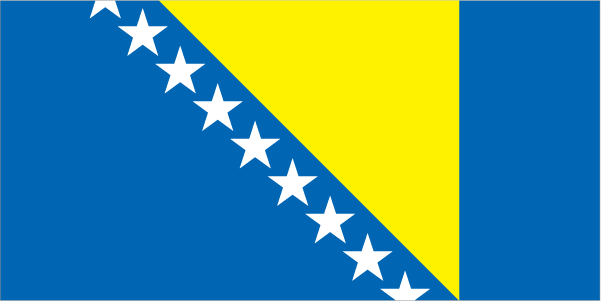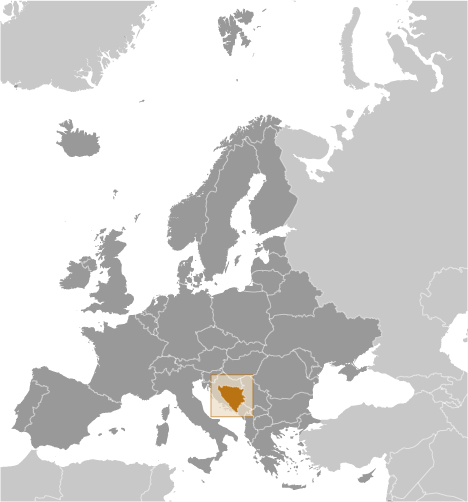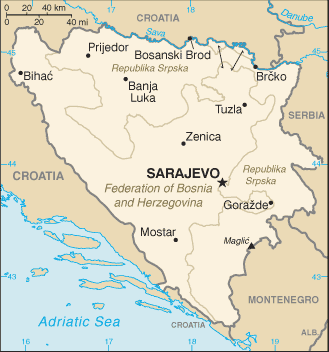Bosnia and Herzegovina's declaration of sovereignty in October 1991 was followed by a declaration of independence from the former Yugoslavia on 3 March 1992 after a referendum boycotted by ethnic Serbs. The Bosnian Serbs - supported by neighboring Serbia and Montenegro - responded with armed resistance aimed at partitioning the republic along ethnic lines and joining Serb-held areas to form a "Greater Serbia." In March 1994, Bosniaks and Croats reduced the number of warring factions from three to two by signing an agreement creating a joint Bosniak/Croat Federation of Bosnia and Herzegovina. On 21 November 1995, in Dayton, Ohio, the warring parties initialed a peace agreement that brought to a halt three years of interethnic civil strife (the final agreement was signed in Paris on 14 December 1995). The Dayton Peace Accords retained Bosnia and Herzegovina's international boundaries and created a multi-ethnic and democratic government charged with conducting foreign, diplomatic, and fiscal policy. Also recognized was a second tier of government composed of two entities roughly equal in size: the Bosniak/Croat Federation of Bosnia and Herzegovina and the Bosnian Serb-led Republika Srpska (RS). The Federation and RS governments were charged with overseeing most government functions. The Dayton Accords also established the Office of the High Representative (OHR) to oversee the implementation of the civilian aspects of the agreement. The Peace Implementation Council (PIC) at its conference in Bonn in 1997 also gave the High Representative the authority to impose legislation and remove officials, the so-called "Bonn Powers." In 1995-96, a NATO-led international peacekeeping force (IFOR) of 60,000 troops served in Bosnia to implement and monitor the military aspects of the agreement. IFOR was succeeded by a smaller, NATO-led Stabilization Force (SFOR) whose mission was to deter renewed hostilities. European Union peacekeeping troops (EUFOR) replaced SFOR in December 2004; their mission is to maintain peace and stability throughout the country. EUFOR's mission changed from peacekeeping to civil policing in October 2007, with its presence reduced from nearly 7,000 to less than 2,500 troops. Troop strength at the end of 2009 stood at roughly 2,000. In January 2010, Bosnia and Herzegovina assumed a nonpermanent seat on the UN Security Council for the 2010-11 term.
Country Name
Conventional long form:none
Conventional short form:Bosnia and Herzegovina
Local long form:none
Local short form:Bosna i Hercegovina
Former:People's Republic of Bosnia and Herzegovina, Socialist Republic of Bosnia and Herzegovina
Government Type
emerging federal democratic republic
Capital
Name:Sarajevo
Geographic coordinates:43 52 N, 18 25 E
Time difference:UTC+1 (6 hours ahead of Washington, DC during Standard Time)
daylight saving time: +1hr, begins last Sunday in March; ends last Sunday in October
Administrative divisions
2 first-order administrative divisions and 1 internationally supervised district* - Brcko district (Brcko Distrikt)*, the Bosniak/Croat Federation of Bosnia and Herzegovina (Federacija Bosna i Hercegovina) and the Bosnian Serb-led Republika Srpska; note - Brcko district is in northeastern Bosnia and is a self-governing administrative unit under the sovereignty of Bosnia and Herzegovina and formally held in condominium between the two entities; the District remains under international supervision
Independence
1 March 1992 (from Yugoslavia; referendum for independence completed on 1 March 1992; independence declared on 3 March 1992)
National Holiday
National Day, 25 November (1943)
Constitution
the Dayton Peace Accords, signed on 14 December 1995 in Paris, included a constitution; note - each of the entities also has its own constitution
Legal system
based on civil law system; has not accepted compulsory ICJ jurisdiction
Suffrage
18 years of age, 16 if employed; universal
Executive branch
Chief of state:Chairman of the Presidency Haris SILAJDZIC (chairman since 6 March 2010; presidency member since 1 October 2006 - Bosniak); other members of the three-member presidency rotate every eight months: Zeljko KOMSIC (presidency member since 1 October 2006 - Croat); and Nebojsa RADMANOVIC (presidency member since 1 October 2006 - Serb)
Head of government:Chairman of the Council of Ministers Nikola SPIRIC (since 11 January 2007)
Cabinet:Council of Ministers nominated by the council chairman; approved by the state-level House of Representatives
(For more information visit the World Leaders website)
Elections:the three members of the presidency (one Bosniak, one Croat, one Serb) elected by popular vote for a four-year term (eligible for a second term, but then ineligible for four years); the chairmanship rotates every eight months and resumes where it left off following each general election; election last held on 1 October 2006 (next to be held in October 2010); the chairman of the Council of Ministers appointed by the presidency and confirmed by the state-level House of Representatives
Election results: percent of vote - Nebojsa RADMANOVIC with 53.3% of the votes for the Serb seat; Zeljko KOMSIC with 39.6% of the votes for the Croat seat; Haris SILAJDZIC with 62.8% of the votes for the Bosniak seat
note: President of the Federation of Bosnia and Herzegovina: Borjana KRISTO (since 21 February 2007); Vice Presidents Spomenka MICIC (since 21 February 2007) and Mirsad KEBO (since 21 February 2007); President of the Republika Srpska: Rajko KUZMANOVIC (since 28 December 2007)
Legislative branch
bicameral Parliamentary Assembly or Skupstina consists of the House of Peoples or Dom Naroda (15 seats, 5 Bosniak, 5 Croat, 5 Serb; members elected by the Bosniak/Croat Federation's House of Representatives and the Republika Srpska's National Assembly to serve four-year terms); and the state-level House of Representatives or Predstavnicki Dom (42 seats, 28 seats allocated for the Federation of Bosnia and Herzegovina and 14 seats for the Republika Srpska; members elected by popular vote on the basis of proportional representation to serve four-year terms); note - Bosnia's election law specifies four-year terms for the state and first-order administrative division entity legislatures
Elections:House of Peoples - last constituted in February 2007 (next to be constituted in 2011); state-level House of Representatives - elections last held on 1 October 2006 (next to be held in October 2010)
Election results:House of Peoples - percent of vote by party/coalition - NA; seats by party/coalition - NA; state-level House of Representatives - percent of vote by party/coalition - NA; seats by party/coalition - SDA 9, SBiH 8, SNSD 7, SDP 5, HDZ-BH 3, HDZ1990 2, SDS 2, PDP 1, DP 1, other 4
note: the Bosniak/Croat Federation has a bicameral legislature that consists of a House of Peoples (58 seats - 17 Bosniak, 17 Croat, 17 Serb, 7 other); last constituted February 2007; and a House of Representatives (98 seats; members elected by popular vote to serve four-year terms); elections last held on 1 October 2006 (next to be held in October 2010); percent of vote by party - NA; seats by party/coalition - SDA 28, SBiH 20, SDP 17, HDZ-BH 7, HDZ1990 4, other 22; the Republika Srpska has a National Assembly (83 seats; members elected by popular vote to serve four-year terms); elections last held on 1 October 2006 (next to be held in October 2010); percent of vote by party - NA; seats by party/coalition - SNSD 41, SDS 15, PDP 7, DNS 4, SBiH 4, SPRS 3, SDA 3, other 6; as a result of the 2002 constitutional reform process, a 28-member Republika Srpska Council of Peoples (COP) was established in the Republika Srpska National Assembly including 8 Croats, 8 Bosniaks, 8 Serbs, and 4 members of the smaller communities
Judicial branch
BiH Constitutional Court (consists of nine members: four members are selected by the Bosniak/Croat Federation's House of Representatives, two members by the Republika Srpska's National Assembly, and three non-Bosnian members by the president of the European Court of Human Rights); BiH State Court (consists of 44 national judges and seven international judges and has three divisions - Administrative, Appellate and Criminal - having jurisdiction over cases related to state-level law and cases initiated in the entities that question BiH's sovereignty, political independence, or national security or with economic crimes that have serious repercussions to BiH's economy, beyond that of an entity or Brcko District); a War Crimes Chamber opened in March 2005
note: the entities each have a Supreme Court; each entity also has a number of lower courts; there are 10 cantonal courts in the Federation, plus a number of municipal courts; the Republika Srpska has five district courts and a number of municipal courts
Political Parties and Leaders
Alliance for a Better Future of BiH or SBB-BiH [ Fahrudin RADONCIC]; Alliance of Independent Social Democrats or SNSD [Milorad DODIK]; Bosnian Party or BOSS [Mirnes AJANOVIC]; Bosnian Patriotic Party or BPS [Sefer HALILOVIC]; Civic Democratic Party or GDS [Ibrahim SPAHIC]; Croat Party of Rights or HSP [Zvonko JURISIC]; Croat Peasants' Party-New Croat Initiative or HSS-NHI [Ljiljana LOVRIC]; Croatian Christian Democratic Union of Bosnia and Herzegovina or HKDU [Ivan MUSA]; Croatian Democratic Union of Bosnia and Herzegovina or HDZ-BiH [Dragan COVIC]; Croatian Democratic Union 1990 or HDZ-1990 [Bozo LJUBIC]; Croatian Peoples Union [Milenko BRKIC]; Democratic National Union or DNZ [Rifat DOLIC]; Democratic Party or DP [Dragan CAVIC]; Democratic Peoples' Alliance or DNS [Marko PAVIC]; Liberal Democratic Party or LDS [Rasim KADIC]; Nasa Stranka or NS [Bojan BAJIC]; New Socialist Party or NSP [Zdravko KRSMANOVIC]; Party for Bosnia and Herzegovina or SBiH [Haris SILAJDZIC]; Party of Democratic Action or SDA [Sulejman TIHIC]; Party of Democratic Progress or PDP [Mladen IVANIC]; Peoples' Party of Work for Progress or NSRzB [Mladen IVANKOVIC-LIJANOVIC]; Serb Democratic Party or SDS [Mladen BOSIC]; Serb Radical Party of the Republika Srpska or SRS-RS [Milanko MIHAJLICA]; Serb Radical Party-Dr. Vojislav Seselj or SRS-VS [Mirko BLAGOJEVIC]; Social Democratic Party of BiH or SDP [Zlatko LAGUMDZIJA]; Social Democratic Union or SDU [Nermin PECANAC]; Socialist Party of Republika Srpska or SPRS [Petar DJOKIC]
Political pressure groups and leaders
other:war veterans; displaced persons associations; family associations of missing persons; private media
International organization participation
BIS, CE, CEI, EAPC, EBRD, FAO, G-77, IAEA, IBRD, ICAO, ICCt, ICRM, IDA, IFAD, IFC, IFRCS, ILO, IMF, IMO, IMSO, Interpol, IOC, IOM, IPU, ISO, ITSO, ITU, ITUC, MIGA, MONUC, NAM (observer), OAS (observer), OIC (observer), OPCW, OSCE, PFP, SECI, UN, UN Security Council (temporary), UNCTAD, UNESCO, UNIDO, UNWTO, UPU, WCO, WFTU, WHO, WIPO, WMO, WTO (observer)
Diplomatic representation in the US
Chief of mission:Ambassador Mitar KUJUNDZIC
Chancery:2109 E Street NW, Washington, DC 20037
Telephone:[1] (202) 337-1500
FAX:[1] (202) 337-1502
Consulate(s) general:Chicago, New York
Diplomatic representation from the US
Chief of mission:Ambassador Charles L. ENGLISH
Embassy:Alipasina 43, 71000 Sarajevo
Mailing address: use embassy street address
Telephone:[387] (33) 445-700
FAX: [387] (33) 659-722
branch office(s): Banja Luka, Mostar
Flag description
a wide medium blue vertical band on the fly side with a yellow isosceles triangle abutting the band and the top of the flag; the remainder of the flag is medium blue with seven full five-pointed white stars and two half stars top and bottom along the hypotenuse of the triangle; the triangle approximates the shape of the country and its three points stand for the constituent peoples - Bosniaks, Croats, and Serbs; the stars represent Europe and are meant to be continuous (thus the half stars at top and bottom); the colors (white, blue, and yellow) are often associated with neutrality and peace, and traditionally are linked with Bosnia










